Amazon dominates the U.S. ecommerce market with a whopping 37.6 percent share in 2023. Walmart trails far behind at 6.4 percent. Independent U.S. sellers on Amazon alone sold over 4.1 billion products in 2022 (about 7,800 per minute), which averages to over $230,000 in annual sales per seller.
Obviously, you’d like to benefit from having your products appear on the Amazon marketplace. But how do you do that if you run a Magento store?
Enter Magento Amazon integration extensions. These easy-to-install tools make it possible to display your products in your Magento 2 store and on Amazon, resulting in a win-win for both you and your customers.
Let’s take a look at how to integrate Magento with Amazon, explore a list of vetted Magento Amazon extensions, and go over some best practices for choosing the right plugin for your business.
- What is Magento Amazon integration?
- Benefits of Magento Amazon integration
- How to integrate Magento with Amazon
- How to integrate Amazon Pay in Magento
- Top Magento Amazon integration extensions
- How to choose a Magento Amazon integration extension
- Final thoughts: Magento Amazon integration guide for sellers
What is Magento Amazon integration?
Magento Amazon integration is a two-way connection between your Amazon and Magento 2 stores. The integration makes it easy to transfer product data from one to the other. Integrating Magento and Amazon helps you eliminate the worry of updating both stores manually. This way, you can import your Amazon orders and products to your Magento 2 store with just a few clicks and also export your Magento products to Amazon.
Benefits of Magento Amazon integration
Integrating your Magento store with Amazon benefits your business in a number of ways:
- Seamless store management: Amazon integration extensions keep your stores connected, allowing you to manage inventory and orders in one place.
- Single source of truth: These plugins aggregate data from all your stores in real time, providing a single source of truth for making analytics-related decisions.
- Omnichannel presence: Magento Amazon integration lets your business tap into Amazon’s massive customer base, so you can reach buyers in over 100 countries and regions.
- Improved customer service: Using an Amazon extension helps you provide a better customer experience by offering a unified shopping experience across your Magento store and Amazon.
How to integrate Magento with Amazon
Follow these four steps to connect your Magento store to Amazon.
1. Create an Amazon Seller account
You'll need an Amazon Seller account to get this integration going. It’s what lets you sell on the marketplace. Visit Amazon Seller Central to sign up.
Please note that only Amazon sellers who pay for the Professional plan can connect external applications to the Amazon marketplace. There’s a significant jump in pricing from the Individual to Professional plan, so make sure to take that into consideration when deciding to integrate your Magento and Amazon stores.
2. Install a Magento Amazon integration extension
Once you've created a Seller Central account, choose an extension from the eight we've covered below.
Alternatively, install an Amazon integration extension from the Adobe Commerce marketplace. Use the search bar to narrow your search by category, edition, price, partner type, and subscription.
The platform also lets you sort by relevance and rating. This makes it even easier to find the perfect extension for you.
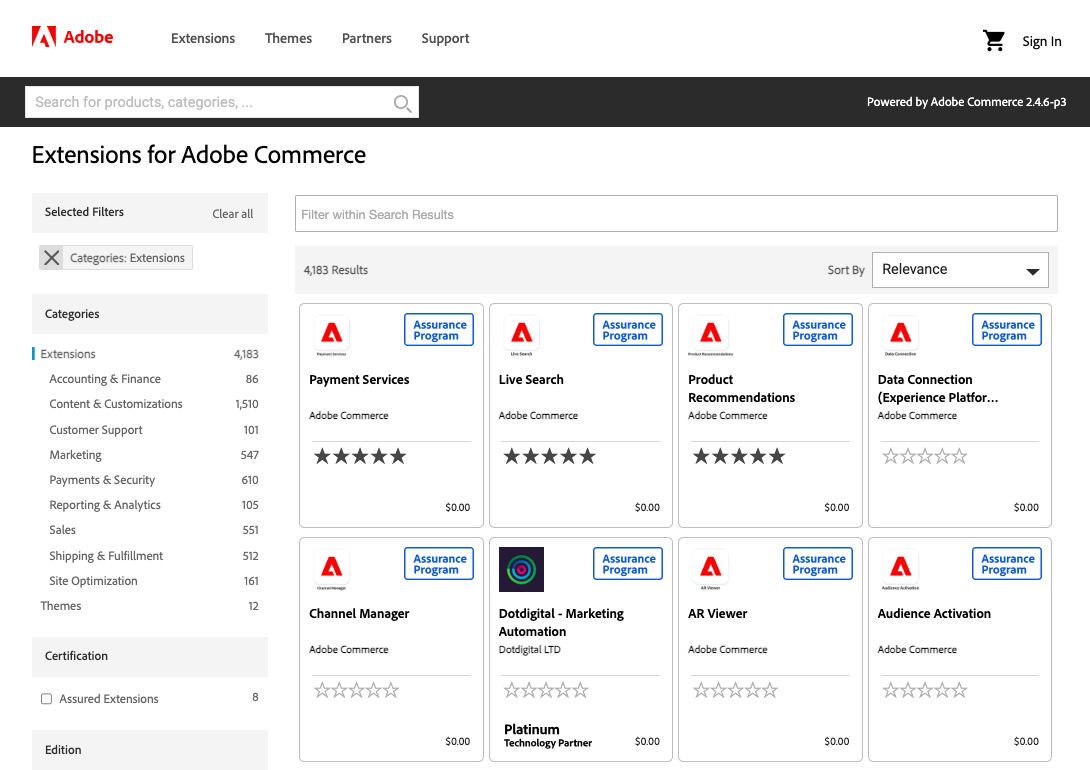
After choosing an extension that meets your needs, follow Adobe’s instructions to install, verify, and enable the extension.
3. Link the extension to your Amazon account
Once you've installed an extension, link it to your Amazon account and connect your Magento and Amazon stores.
The steps vary depending on the extension, but you'll need to find the Amazon Magento integration module on your dashboard. Here is how the 247 CloudHub module appears in the sidebar of your Magento admin area after it has been installed.
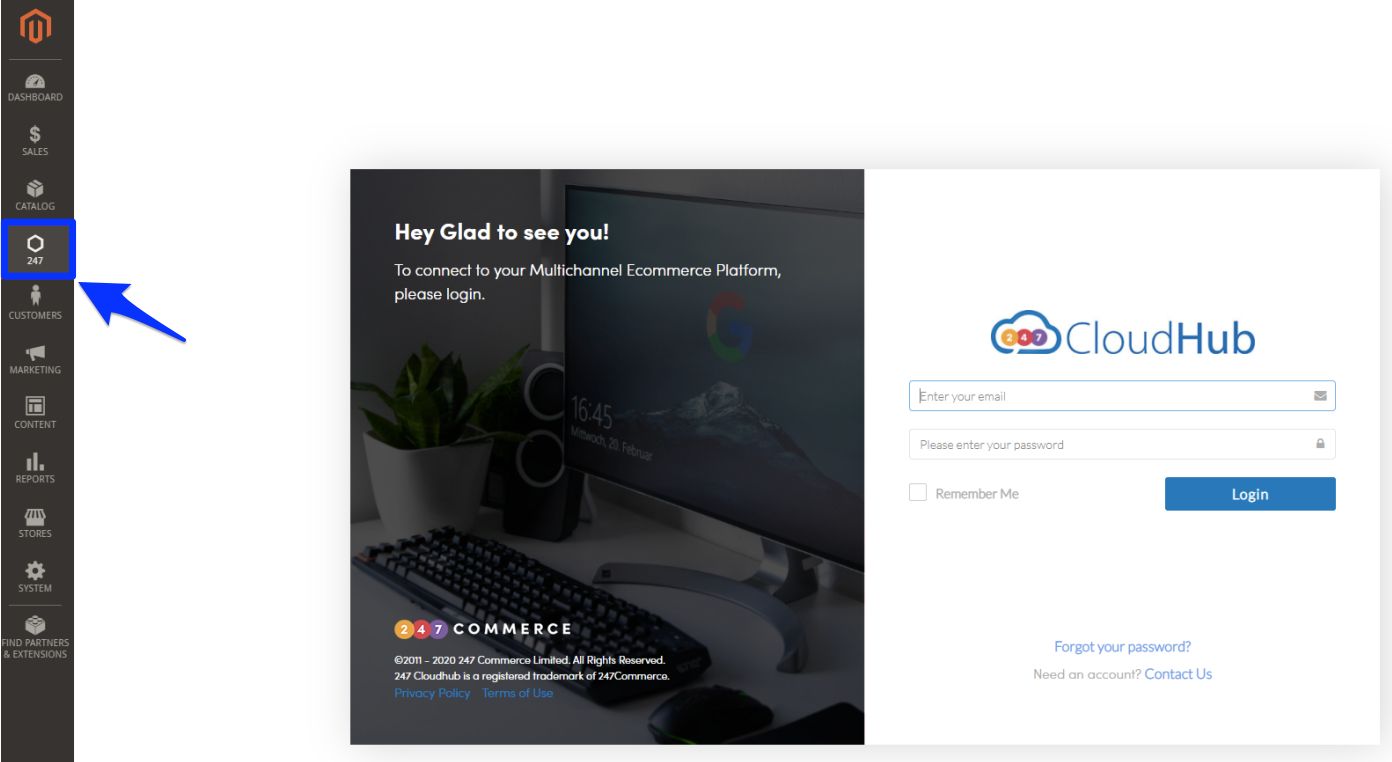
Open or sign in to the module to connect your Amazon Seller account. If you need help, the extension vendor’s customer support team should be able to walk you through the steps.
4. Test your configuration and start selling
Configure the extension to match your needs, such as shipping options, pricing policy, and product listings.
Then, create some test products on Amazon and Magento to see how well they sync up. Check the storefronts to ensure the products, prices, and shipping options are identical in both stores. If they're not, contact the software vendor for help.
Once everything looks good, start selling.
How to integrate Amazon Pay in Magento
Now that you’ve connected your Magento store to Amazon, it’s time to integrate Amazon Pay to ease order checkout. Here are the five steps you’ll have to follow.
1. Set up Amazon Pay
Within your Seller Central account, navigate to the Integration section. Locate and select Amazon Pay to access the tools and resources necessary for integrating Amazon Pay with your Magento store.
Follow the prompts in the Amazon Pay section of Seller Central to configure your account settings. This involves obtaining API keys, defining your payment gateway preferences, and configuring other options to align Amazon Pay with your business needs.
2. Install an Amazon Pay extension
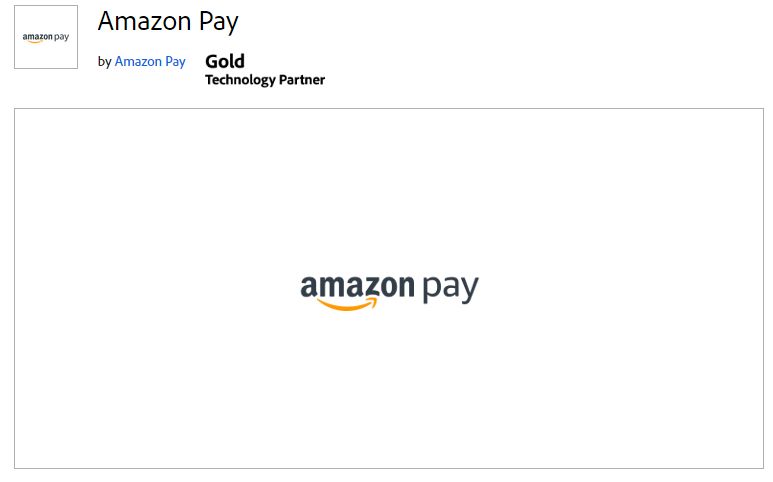
Log in to the Magento Admin backend. Use the Magento marketplace or Composer to find and install the official Amazon Pay extension designed for Magento. This extension will facilitate the seamless integration of Amazon Pay into your online store.
3. Configure the extension
Once you install the Amazon Pay extension, access the Magento Admin Panel to configure it. Input the API keys you generated earlier and adjust settings to match the product information on your Amazon Seller Central account during setup.
4. Test the Magento Amazon integration
Conduct test transactions within a controlled environment to ensure that the communication between Magento and Amazon Pay is functioning correctly. This step is crucial for identifying and addressing potential issues before going live.
5. Go live
After successful testing, enable the Amazon Pay extension for live transactions. Update any necessary settings in the Magento Admin Panel and your Amazon Seller Central account to transition from the testing phase to full implementation.
Top Magento Amazon integration extensions
You know how to integrate Magento 2 with your Amazon store and set up Amazon Pay. Now it’s time to explore the top eight Amazon extensions that make it all possible.
Here are the best Magento Amazon integration extensions currently available.
1. Amazon Multi-Channel Fulfillment by Amazon
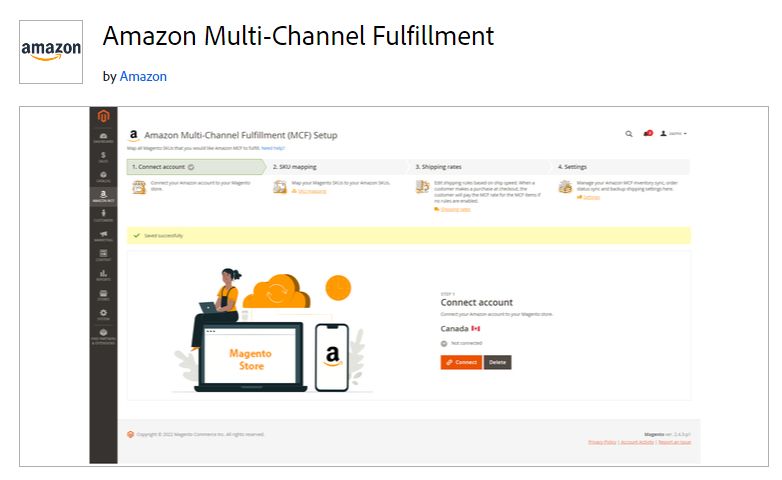
Amazon Multi-Channel Fulfillment brings Amazon's fulfillment and logistics capabilities to your Magento store. This Magento Amazon integration extension is compatible with Magento 2.4 and 2.3. It works whether you’re using the open source, cloud, or on-premises edition.
Please note, though, that it’s obsolete on version 2.3 and Magento 1 editions. Also, the extension’s support team can only be reached via email.
Key features:
- Provides pick-pack and shipping services to users.
- Offers prime-like delivery services.
- Leverages Amazon’s more than 200 global fulfillment centers.
- Supports multiple Amazon stores.
- Allows custom shipping configurations for each connected store.
- Enables seamless stock keeping unit (SKU) imports and automatic sync with your Amazon Sellers account inventory.
Best Magento Amazon integration extension for: Those using the Amazon FBA (Fulfillment by Amazon) program and Magento integration.
Pricing: Free.
2. Amazon Integration by CedCommerce
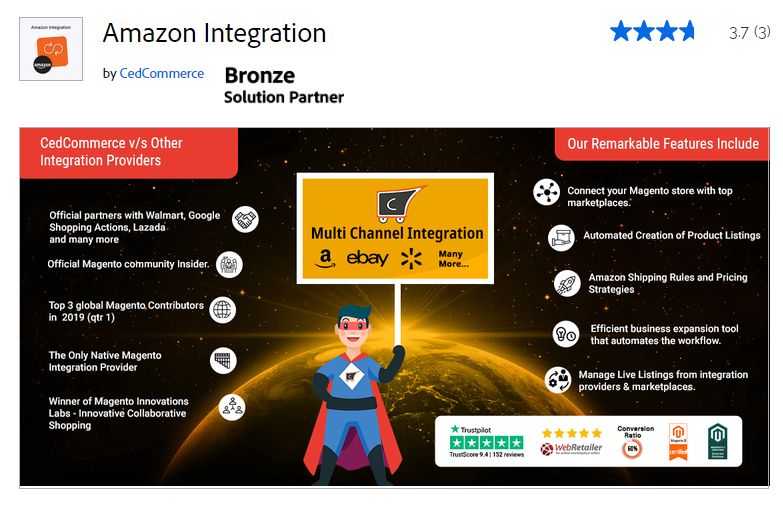
CedCommerce's Amazon Integration extension supports listing, pricing, and order synchronization between Magento 2 and Amazon stores. This integration extension works well across Adobe Commerce editions. You can access multiple support channels, including email, Skype Chat, instant chat, and a toll-free phone number.
Key features:
- Allows many-to-one product category mapping to map many Magento 2 store categories to one Amazon store category.
- Supports bulk product uploads.
- Provides low stock, new orders, and rejected product notifications.
- Synchronizes with over 50 marketplaces, including Amazon, eBay, and Walmart.
- Centralizes order and inventory management.
- Enables automated workflows and product listing creation.
Best Magento Amazon integration extension for: Automated selling and intelligent product feed management.
Pricing: Starts from $899 plus a $99 optional installation fee.
3. Amazon Sales Channel by Adobe Commerce

Amazon Sales Channel is the native Magento Amazon integration from Adobe Commerce. It helps B2C and B2B merchants sell on the U.S., UK, Canada, and Mexico Amazon marketplaces. This extension is compatible with all the latest Magento editions and comes with a helpful user guide. For more personalized assistance, you can submit a ticket through the Adobe Commerce Support Help Center.
Key features:
- Integrates with multiple Amazon marketplaces.
- Synchronizes product listings across all your stores in real time.
- Offers flexible fulfillment, including FBA, independent fulfillment, or both.
- Supports B2B volume tiered pricing to allow quantity-based discounts.
- Provides a currency conversion tool.
Best Magento Amazon integration extension for: B2B and B2C Magento store merchants.
Pricing: Free.
4. M2E Pro Amazon eBay & Walmart Integration by M2E
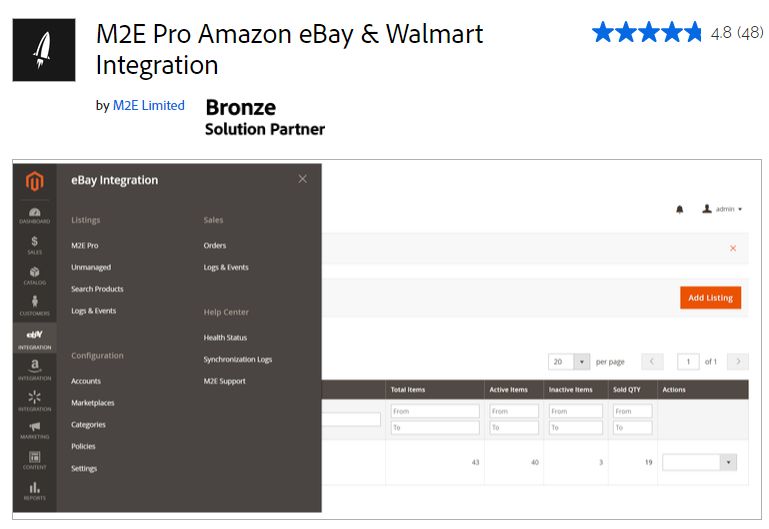
The M2E Pro Amazon eBay & Walmart Integration allows Magento store merchants to sell on Amazon, eBay, and Walmart simultaneously, opening multiple touchpoints to reach shoppers and boost sales. This Magento Amazon integration extension works on the latest Magento versions. Plus, you get a 30-day free trial on all paid plans.
Key features:
- Supports 19 Amazon, 20 eBay, and two Walmart marketplaces.
- Provides real-time sales data and in-depth marketplace-specific analytics.
- Offers automated Amazon pricing optimization to beat the competition.
- Supports seamless product synchronization and order management.
- Makes setup easy with different configuration templates.
Best Magento Amazon integration extension for: Multiple marketplace integrations.
Pricing: Free extension. M2E Pro requires a paid monthly subscription.
5. Amazon Connector by Webkul
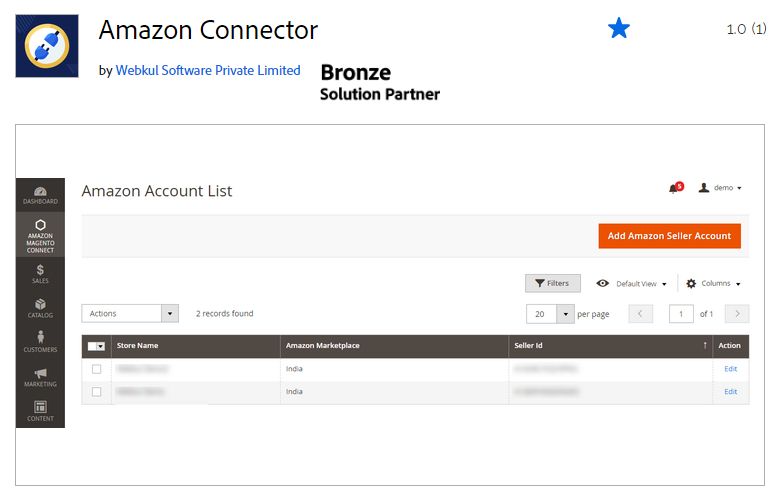
Webkul’s Amazon Connector makes it easy for merchants to sync their product data across multiple Amazon stores and manage inventory and orders from a single dashboard. You can perform real-time data sync and manage both configurable and simple products.
This extension offers three months of free technical support with the option of six or 12 months of extended paid support.
Key features:
- Provides free lifetime module updates.
- Allows the integration of multiple Amazon stores.
- Makes it easy to centralize order and inventory management.
- Auto-synchronizes orders.
- Lets you set multiple price rules and advanced product category mapping.
Best Magento Amazon integration extension for: Technical support.
Pricing: Starts from $598 plus an optional $120 installation cost.
6. Amazon Seller EDI by webvisum GmbH
Amazon Seller EDI by webvisum GmbH connects your Magento 2 store to your Amazon Vendor Central account. This way, you can import orders from Amazon Vendor to Magento and vice versa, allowing multichannel selling to reach new customers. The extension only works on Magento Open Source stores and leans toward tech-savvy users, as it requires Magento developer skills to install, map, and configure.
Key features:
- Set up Amazon EDI (electronic data interchange) in your Magento admin panel.
- Extend the module for more functionalities and scalability.
- Sends automatic shipping confirmation to Amazon over API.
- Operates on a cron schedule.
- Offers automated invoicing.
Best Magento Amazon integration extension for: Amazon Vendor Central sellers.
Pricing: $999 yearly.
7. 247 CloudHub Multichannel Connector by 247 Commerce Limited
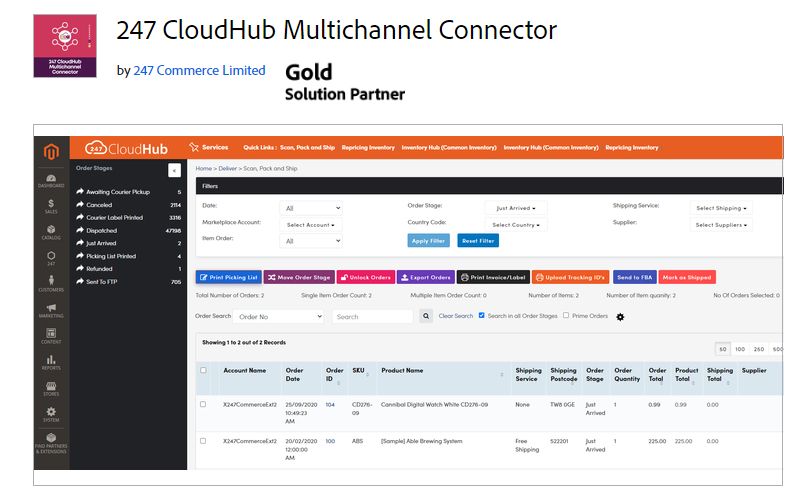
The 247 CloudHub Multichannel Connector lets you connect your Magento store to several marketplaces, including Amazon. It works on all Adobe Commerce editions, but you’ll need a separate 247 CloudHub account to use the extension.
The extension lets you gain easy access to Amazon through the Magento admin interface. This, in turn, offers a flexible, customizable framework for multichannel retailers and wholesalers.
Key features:
- Integrates with multiple marketplaces, including Amazon, eBay, and Shopify.
- Reprices your Amazon products.
- Offers automated product deliveries.
- Provides carrier labels, shipping pick lists, and invoice printing.
- Generates in-depth management reports and analytics.
Best Magento Amazon integration extension for: Multichannel sellers.
Pricing: Contact 247 CloudHub sales team for pricing.
8. Store Manager Bridge Connector by eMagicOne
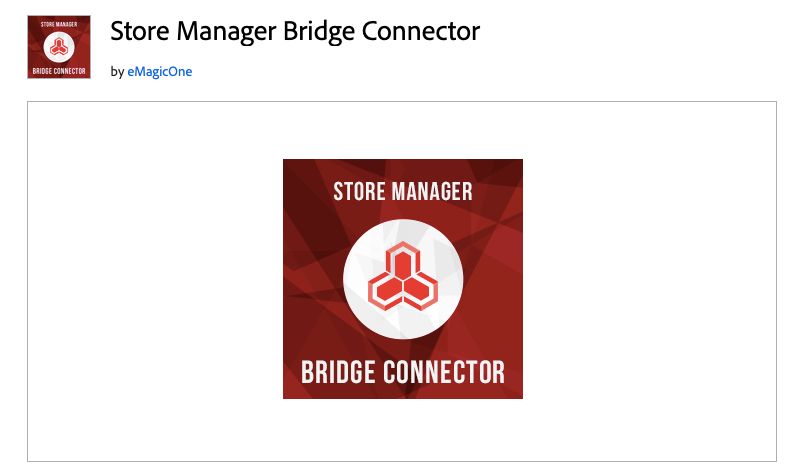
The final extension on our list, Store Manager Bridge Connector, enables offline management of your catalog, categories, attributes, customers, and orders. You can sync changes with your store once you’re back online. This extension supports Export and Import Wizards for bulk changes.
In addition to Amazon, the extension offers eBay integration, letting you sell beyond one ecommerce platform. You can also schedule automatic inventory updates from various file sources and in multiple formats.
Key features:
- Synchronize Amazon and eBay with Magento data.
- Export or import data in multiple formats.
- Manage products and categories in bulk or individually.
- Centralize your inventory management.
Best Magento Amazon integration extension for: Enterprise resource planning (ERP).
Pricing: Free as part of Store Manager Professional and Adobe Commerce (Magento Enterprise) plans. A lifetime Store Manager Professional plan starts at $699.
How to choose a Magento Amazon integration extension
The best Magento Amazon integration extension for you depends on your specific needs and requirements. Here are some factors to consider before making a final choice:
Identify must-have features
List all of the features the extension you choose needs to have, then compare them to each extension’s offerings. Choose the one that checks all or most of the boxes. This way, you won't have to worry about switching extensions or paying for add-ons later when your ecommerce store grows.
Decide on your budget
Figure out how much you can reasonably spend on a Magento Amazon integration extension. Also, consider how much you’re willing to spend in the long term. For example, would you rather pay a one-time fee or a monthly subscription? A monthly subscription becomes expensive over time but can offer a quick start. If you plan to switch extensions or prefer monthly payments, consider subscriptions.
Work within your level of technical expertise
Most Magento extensions require you to have some developer skills to install and set them up. Unless you’re willing to pay for installation and continuous support, ensure you choose an extension within your technical capabilities.
Final thoughts: Magento Amazon integration guide for sellers
Magento Amazon integration extensions make it easier to pursue multichannel expansion, tap into Amazon’s large market size, and provide a consistent customer experience across your stores.
While this guide helps you find, choose, and install the right extension for your store, your business’s success ultimately rests on the ecommerce web host you use.
At Nexcess, we offer several managed Magento hosting plans for you to choose from. Along with our guaranteed customer care, our plans come with free SSL certificates, Elasticsearch, and a CDN powered by Cloudflare.
Contact us today to get started.

